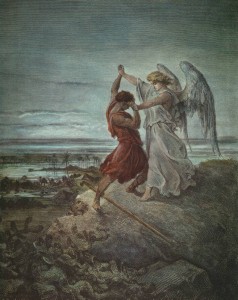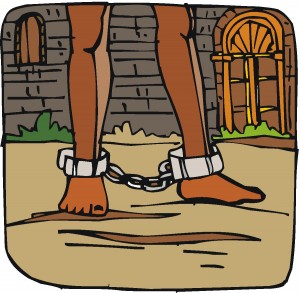Genesis 32:24, Wrestled with him. Why did Elohim wrestle all night with Jacob? Why not just wound him early on and save the time and trouble? What does this teach us about the long-suffering nature of Elohim who will continue to strive with us and our fleshy tendencies and self-reliances until we finally submit to him and recognize that only through him can we have real strength and victory, though we might end up physically lame in the process?

Let’s break this story down.
Why the wrestling all night “till the breaking of the day”? What does night and breaking of day represent metaphorically with regard to our spiritual walk?
What does this teach us about faith, the struggles of this life and about not giving up until the very end when the blessings and dawning of a new day are about to break forth?
Jacob received the new name of Israel during this time (verse 28). Through this struggle, he took a quantum leap spiritually and became a new man with a new identity. Has this ever happened to you? Don’t we progress spiritually only out of crisis? “There is no gain where there is no gain,” as the saying goes.
What were the results of Jacob’s struggle? Verse 32 says of Jacob, “as he passed over Penuel the sun rose upon him, and he limped upon his thigh.” Penuel means “faces of El.” Taking a little poetic license (at the drash/allegorical or third level of Jewish biblical interpretation) here, we could paraphrase this verse as follows:
“As Jacob emerged out of the darkness of self-reliance, the face of Elohim shined favorably upon him as he no longer relied on the flesh.”
Pause to reflect on this for a moment and take quick stock of your spiritual walk in the light of these words.
Who are some other notable Biblical characters besides Jacob who struggled with trying to achieve their divine mission through human means? How about Abraham with Hagar, Moses when he murdered the Egyptian, Samson, or Peter when he cut off the ear of the high priest’s servant? Can you think of some others? What did these men learn about walking in the Spirit versus walking in the flesh?
Genesis 32:28, Jacob but Israel. Jacob/Ya’acov means “heel snatcher/holder or supplanter,” while Israel/Yisra’el means “Prince of El or El Prevails/Prevailer with El.” What can we learn about the change of Jacob’s character as reflected in the changing of his name? Who is the focal point of the name and the initiator of the action in the first name … in the second name? What can we learn from this for our own faith walk?
Genesis 32:32, The muscle that shrank. Please notice that the sinew, representing the strength of the flesh, only shrank. It was not removed. What does this signify spiritually with regard to the redeemed man’s old sin nature?
At the point in one’s spiritual journey when one is regenerated by the Spirit of Elohim, a man doesn’t lose his identity, personality or soul (i.e., his mind, will and emotions). What then happens to a person’s soul? It must be transformed and renewed by the Spirit of Elohim to be conformed to YHVH’s perfect will (Rom 12:2). The soul-man will still try to assert dominance over the spirit-man, but man must learn to submit to the Spirit of Elohim.
Paul discusses the struggle between the soul and the spirit in Romans 7:14–25. This is the same struggle that Jacob faced in his dark night of the soul. There he died to his own will and finally submitted totally to that of his Heavenly King.







